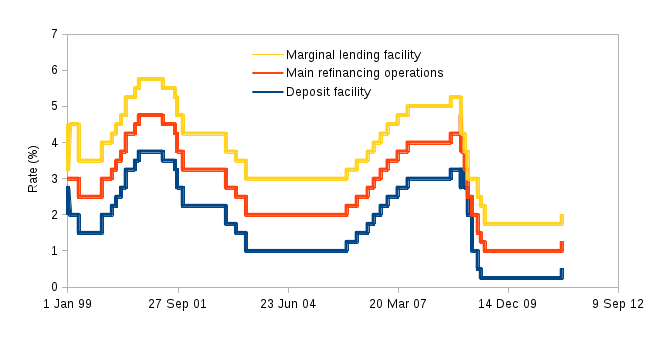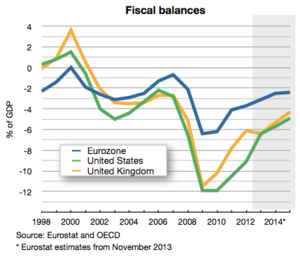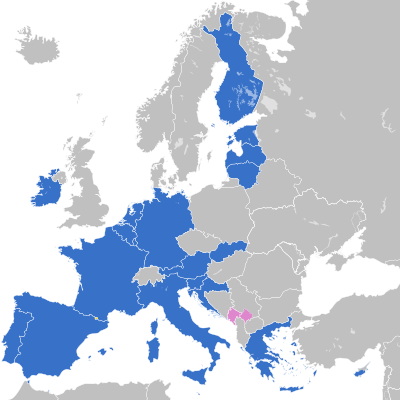Eurozone facts for kids
The euro area, often called the eurozone, is a group of 21 countries within the European Union (EU). These countries have chosen to use the euro (symbol: €) as their main currency. This means the euro is the only legal money they use. By doing this, they follow shared economic rules to work together.
The 21 countries that are part of the eurozone are: Austria, Belgium, Bulgaria, Croatia, Cyprus, Estonia, Finland, France, Germany, Greece, Ireland, Italy, Latvia, Lithuania, Luxembourg, Malta, the Netherlands, Portugal, Slovakia, Slovenia, and Spain.
Some countries outside the EU also use the euro. For example, France and Germany have the largest economies in the eurozone. Their combined economic power makes up almost half of the eurozone's total.
The Eurosystem helps manage the money for the eurozone. The Eurogroup is a meeting of finance ministers who discuss money matters for these countries. The European Central Bank (ECB) sets the main interest rates and prints euro banknotes and coins.
Since the 2008 financial challenges, the eurozone countries have created ways to help each other with loans. They also work together on their national budgets. This shows how they are trying to make their shared economy stronger.
About half of the countries in geographical Europe are in the eurozone. Six EU countries still use their own money: the Czech Republic, Denmark, Hungary, Poland, Romania, and Sweden. All of these, except Denmark, are expected to adopt the euro once they meet certain economic conditions. No country has ever left the eurozone.
| Policy of | European Union |
|---|---|
| Type | Monetary union |
| Currency | Euro |
| Established | 1 January 1999 |
| Member states | |
| Governance | |
| Monetary authority | Eurosystem |
| Political oversight | Eurogroup |
| Statistics | |
| Area | 2,801,552 km2 (1,081,685 sq mi) |
| Population | 358,079,988 (1 January 2026) |
| Density | 125/km2 (323.7/sq mi) |
| GDP (nominal) | €15.231 trillion €43,400 (per capita) (2024) |
| Interest rate | 2.5% |
| Inflation | 2.4% (February 2025) |
| Unemployment | 6.2% (January 2025) |
| Trade balance | €310 billion trade surplus |
Contents
Understanding the Euro Area
How the Eurozone Started
The eurozone officially began on January 1, 1999. At that time, eleven countries from the European Union met the requirements to use the euro. These first countries were: Austria, Belgium, Finland, France, Germany, Ireland, Italy, Luxembourg, the Netherlands, Portugal, and Spain. Greece joined them on January 1, 2001.
On January 1, 2002, these twelve founding members started using physical euro banknotes and euro coins. After a short time, their old national currencies were no longer valid.
Between 2007 and 2026, nine more countries joined the eurozone. These include Bulgaria, Croatia, Cyprus, Estonia, Latvia, Lithuania, Malta, Slovakia, and Slovenia.
Countries Using the Euro
Here is a list of the countries that use the euro and when they joined:
- Austria (1999)
- Belgium (1999)
- Bulgaria (2026)
- Croatia (2023)
- Cyprus (2008)
- Estonia (2011)
- Finland (1999)
- France (1999)
- Germany (1999)
- Greece (2001)
- Ireland (1999)
- Italy (1999)
- Latvia (2014)
- Lithuania (2015)
- Luxembourg (1999)
- Malta (2008)
- Netherlands (1999)
- Portugal (1999)
- Slovakia (2009)
- Slovenia (2007)
- Spain (1999)
Other Places Using the Euro
Some small countries and territories outside the main EU also use the euro.
- Countries with formal agreements: Andorra, Monaco, San Marino, and Vatican City have special agreements with the EU to use the euro. They even make their own euro coins! However, they are not officially part of the eurozone and don't have a say in the European Central Bank.
- British Territories: Akrotiri and Dhekelia, which are British territories on the island of Cyprus, also use the euro.
- Countries without formal agreements: Kosovo and Montenegro started using the euro on their own, without a special agreement. This means they can't print their own euro coins or banknotes.
Some other currencies are also linked to the euro. For example, the Bosnia and Herzegovina convertible mark and the Bulgarian lev have fixed exchange rates with the euro.
Why Some EU Countries Don't Use the Euro Yet
Six EU countries are not yet part of the eurozone: the Czech Republic, Denmark, Hungary, Poland, Romania, and Sweden.
- Denmark has a special agreement that allows it to choose whether or not to join the euro.
- The other five countries have promised to adopt the euro once their economies meet certain conditions. These conditions include keeping their exchange rates stable for at least two years.
- Sweden held a public vote in 2003 and decided not to adopt the euro. Since then, they have chosen not to meet the requirements needed to join.
Leaving the eurozone is not something the EU rules easily allow. The idea is that once a country joins, it's a permanent decision. However, there have been discussions about what would happen if a country wanted to leave or if it needed to be asked to leave.
How the Euro Area is Managed
The European Central Bank (ECB) is like the central bank for all eurozone countries. It makes decisions about money, such as setting interest rates. The ECB also decides how many euro banknotes and coins should be made. The current President of the ECB is Christine Lagarde.
The finance ministers from all eurozone countries meet regularly in a group called the Eurogroup. They talk about important money matters and how to keep the eurozone economy stable. The current president of the Eurogroup is Paschal Donohoe.
Sometimes, the leaders of the eurozone countries (like presidents and prime ministers) also meet at a Euro summit. These meetings are important for making big decisions about the future of the eurozone.
The Euro Area Economy
The eurozone is a very large economy when all its member countries are combined. It's one of the biggest economies in the world.
Economic Comparison
| Population (2024) | GDP (Local currency) (2024) | GDP (US$) (2024) | |
|---|---|---|---|
| 1408 million | CNY 134.908 trillion | US$ 18.943 trillion | |
| 350 million | EUR 15.231 trillion | US$ 16.483 trillion | |
| 340 million | USD 29.184 trillion | US$ 29.184 trillion |
| Economy |
|
||||||||
|---|---|---|---|---|---|---|---|---|---|
| (01) United States (Peak in 2025) |
30,616
|
||||||||
| (02) China (Peak in 2025) |
19,399
|
||||||||
| (03) |
17,749
|
||||||||
| (04) Japan (Peak in 2012) |
6,272
|
||||||||
| (05) India (Peak in 2025) |
4,125
|
||||||||
| (06) United Kingdom (Peak in 2025) |
3,959
|
||||||||
| (07) Brazil (Peak in 2011) |
2,614
|
||||||||
| (08) Russia (Peak in 2025) |
2,541
|
||||||||
| (09) Canada (Peak in 2025) |
2,284
|
||||||||
| (10) Korea (Peak in 2021) |
1,942
|
||||||||
| (11) Mexico (Peak in 2025) |
1,863
|
||||||||
| (12) Australia (Peak in 2025) |
1,830
|
||||||||
| (13) Turkey (Peak in 2025) |
1,565
|
||||||||
| (14) Indonesia (Peak in 2025) |
1,443
|
||||||||
| (15) Saudi Arabia (Peak in 2025) |
1,269
|
||||||||
| (16) Poland (Peak in 2025) |
1,040
|
||||||||
| (17) Switzerland (Peak in 2025) |
1,003
|
||||||||
| (18) Taiwan (Peak in 2025) |
884
|
||||||||
| (19) Argentina (Peak in 2025) |
683
|
||||||||
| (20) Sweden (Peak in 2025) |
662
|
||||||||
|
The 20 current largest economies in the world including eurozone as a single entity, by nominal GDP (2025) at their peak level of GDP in billions US$. The values for EU members that are not eurozone members are listed separately. |
|||||||||
Inflation in the Euro Area
Inflation is when prices for goods and services go up over time. The ECB works to keep inflation stable. Here are some inflation rates for the eurozone:
- 2000: 2.1%
- 2001: 2.3%
- 2002: 2.3%
- 2003: 2.1%
- 2004: 2.1%
- 2005: 2.2%
- 2006: 2.2%
- 2007: 2.1%
- 2008: 3.3%
- 2009: 0.3%
- 2010: 1.6%
- 2011: 2.7%
- 2012: 2.5%
- 2013: 1.4%
- 2014: 0.4%
- 2015: 0.2%
- 2016: 0.2%
- 2017: 1.5%
- 2018: 1.8%
- 2019: 1.2%
- 2020: 0.3%
- 2021: 2.6%
- 2022: 8.4%
- 2023: 5.4%
- 2024: 2.4%
Interest Rates
 Interest rates are like the cost of borrowing money. The ECB sets these rates for the eurozone. When interest rates are low, it's cheaper to borrow money, which can encourage people and businesses to spend more. When rates are high, borrowing is more expensive.
Interest rates are like the cost of borrowing money. The ECB sets these rates for the eurozone. When interest rates are low, it's cheaper to borrow money, which can encourage people and businesses to spend more. When rates are high, borrowing is more expensive.
Public Debt

Public debt is the money a government owes. Eurozone countries try to keep their public debt at a healthy level compared to their total economic output (GDP). One of the rules is to try not to exceed 60% of their GDP. This helps keep the eurozone stable.
Working Together on Budgets
Eurozone countries work together on their financial plans. They have rules, like the Stability and Growth Pact, that set limits on how much a country can spend more than it earns (its deficit). These rules help ensure that all countries manage their money responsibly. This cooperation helps keep the entire eurozone economy strong.
Helping Each Other in Tough Times
The 2008 financial challenges led to new ways for eurozone countries to support each other. They created special funds, like the European Stability Mechanism (ESM). This fund helps provide emergency loans to member countries that are facing economic difficulties. In return, these countries agree to make economic changes to improve their situation. This system shows how eurozone members work together to overcome financial challenges.
See also
 In Spanish: Eurozona para niños
In Spanish: Eurozona para niños
- Capital Markets Union
- Economic and Monetary Union of the European Union
- European banking union
- Single Euro Payments Area
- List of acronyms associated with the eurozone crisis
- List of people associated with the eurozone crisis
- Sixpack (European Union law)
- Special territories of members of the European Economic Area
- Open Balkan
- Craiova Group





